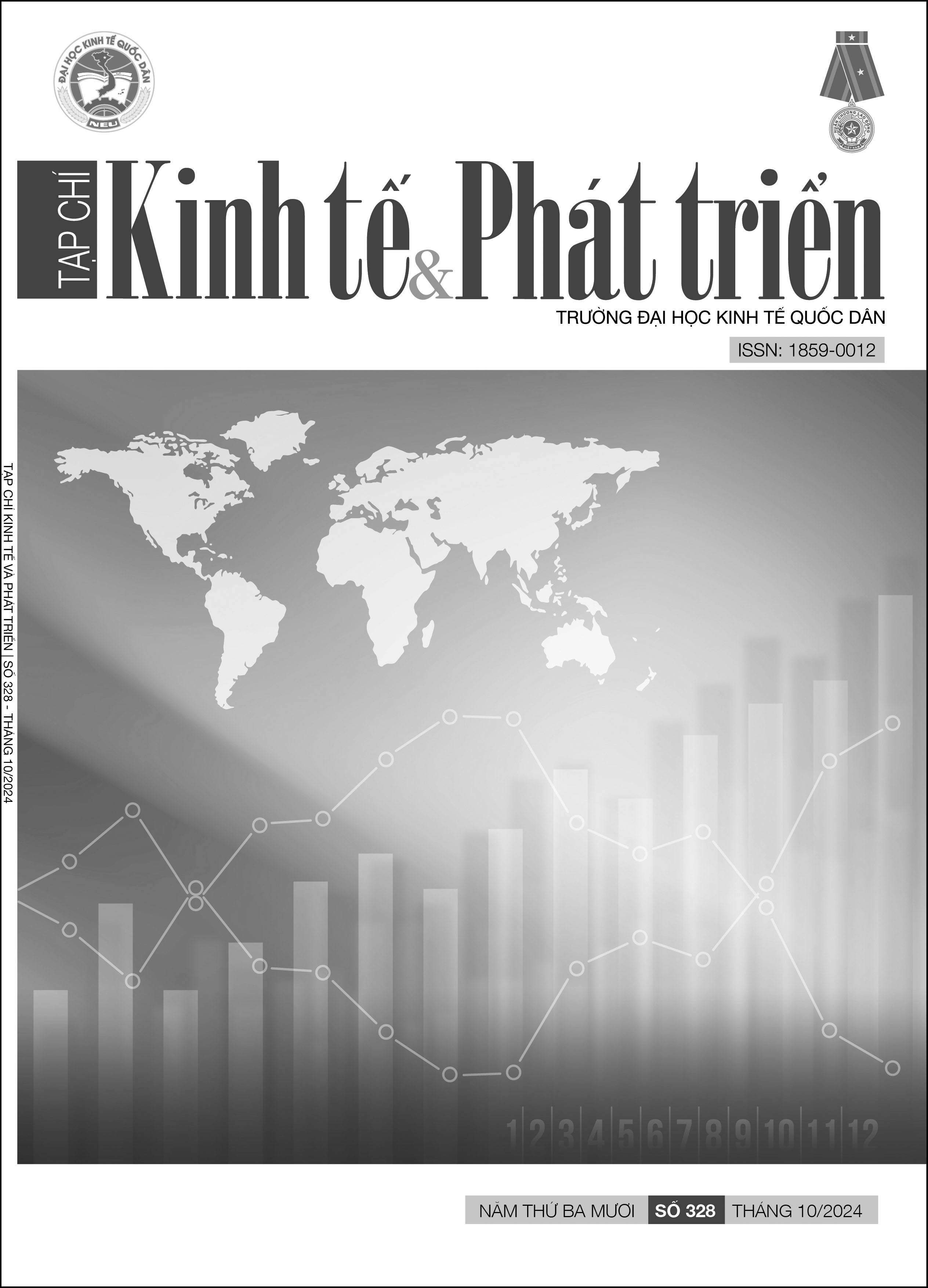Tác động của sự bất định về chính sách kinh tế toàn cầu và rủi ro địa chính trị đến tỷ giá USD/VND: Tiếp cận bằng hồi quy phân vị
DOI:
https://doi.org/10.33301/JED.VI.1625Từ khóa:
Chỉ số bất định chính sách kinh tế toàn cầu, chỉ số rủi ro địa chính trị, hồi quy phân vị, tỷ giá USD/VND, phòng hộ rủi ro, tài sản trú ẩn an toànTóm tắt
Bài viết sử dụng số liệu hàng tháng của tỷ giá USD/VND; chỉ số bất định chính sách kinh tế toàn cầu GEPU và chỉ số rủi ro địa chính trị GPR trong giai đoạn từ 1997 đến 2023 để xem xét mối liên hệ giữa các đại lượng này. Kết quả hồi cho thấy có sự tác động GEPU và GPR đến tỷ giá USD/VND. Sự tác động của GEPU đến tỷ giá USD/VND xảy ra ở tất cả các phân vị của tỷ giá nhưng tác động của chỉ số GPR ở Việt Nam đến tỷ giá USD/VND chỉ tìm thấy ở những phân vị cao từ 0,6 đến 0,9. Tỷ giá USD/VND có thể làm tài sản phòng hộ rủi ro trong điều kiện bất định chính sách kinh tế toàn cầu khi thị trường suy giảm và thị trường bình thường; nhưng không thể làm tài sản phòng hộ rủi ro khi thị trường đi lên. Vì vậy, các nhà đầu tư có thể dự đoán sự thay đổi của tỷ giá USD/VND dựa trên chỉ số GEPU và GPR, từ đó sử dụng tỷ giá này như một tài sản phòng hộ rủi ro.
Tài liệu tham khảo
Antonakakis, N., Gupta, R., Kollias, C., & Papadamou, S. (2017), ‘Geopolitical risks and the oil-stock nexus over 1899–2016’, Finance Research Letters, 23, 165-173. DOI: https://doi.org/10.1016/j.frl.2017.07.017.
Aysan, A. F., Demir, E., Gozgor, G., & Lau, C. K. M. (2019), ‘Effects of the geopolitical risks on Bitcoin returns and volatility’, Research in International Business and Finance, 47, 511-518. DOI: https://doi.org/10.1016/j.ribaf.2018.09.011.
Baker, S. R., Bloom, N., & Davis, S. J. (2016), ‘Measuring economic policy uncertainty’, The Quarterly Journal of Economics, 131(4), 1593-1636. DOI: https://doi.org/10.1093/qje/qjw024.
Balcilar, M., Bonato, M., Demirer, R., & Gupta, R. (2018), ‘Geopolitical risks and stock market dynamics of the BRICS’, Economic Systems, 42(2), 295-306. DOI: https://doi.org/10.1016/j.ecosys.2017.05.008.
Balcilar, M., Gupta, R., & Pierdzioch, C. (2016), ‘Does uncertainty move the gold price? New evidence from a nonparametric causality-in-quantiles test’, Resources Policy, 49, 74-80. DOI: https://doi.org/10.1016/j.resourpol.2016.04.004.
Baur, D. G., & Smales, L. A. (2018), Gold and geopolitical risk. DOI: https://dx.doi.org/10.2139/ssrn.3109136.
Baur, D. G., & Lucey, B. M. (2010), ‘Is gold a hedge or a safe haven? An analysis of stocks, bonds and gold’, Financial review, 45(2), 217-229. DOI: https://doi.org/10.1111/j.1540-6288.2010.00244.x.
Chang, B. H., Derindag, O. F., Hacievliyagil, N., & Canakci, M. (2022), ‘Exchange rate response to economic policy uncertainty: evidence beyond asymmetry’, Humanities and Social Sciences Communications, 9(1), 1-14. DOI: 10.1057/s41599-022-01372-5.
Caldara, D., & Iacoviello, M. (2022), ‘Measuring geopolitical risk’, American Economic Review, 112(4), 1194-1225. DOI: 10.1257/aer.20191823.
Campbell, J. Y., Serfaty‐De Medeiros, K., & Viceira, L. M. (2010), ‘Global currency hedging’, The Journal of Finance, 65(1), 87-121. DOI: https://doi.org/10.1111/j.1540-6261.2009.01524.x.
Chen, L., Du, Z., & Hu, Z. (2020), ‘Impact of economic policy uncertainty on exchange rate volatility of China’, Finance Research Letters, 32, 101266. DOI: https://doi.org/10.1016/j.frl.2019.08.014.
Christou, C., Cunado, J., Gupta, R., & Hassapis, C. (2017), ‘Economic policy uncertainty and stock market returns in PacificRim countries: Evidence based on a Bayesian panel VAR model’, Journal of Multinational Financial Management, 40, 92-102. DOI: https://doi.org/10.1016/j.mulfin.2017.03.001.
Das, D., & Kannadhasan, M. (2018), ‘Do global factors impact bitcoin prices? Evidence from wavelet approach’, Journal of Economic Research, 23(3), 227-264.
Das, D., Kannadhasan, M., & Bhowmik, P. (2019), ‘Geopolitical risk and precious metals’, Journal of Economic Research, 24(1), 49-66. DOI: https://doi.org/10.1016/j.jbankfin.2020.105823.
Guo, P., Zhu, H., & You, W. (2018), ‘Asymmetric dependence between economic policy uncertainty and stock market returns in G7 and BRIC: A quantile regression approach’, Finance Research Letters, 25, 251-258. DOI: https://doi.org/10.1016/j.frl.2017.11.001.
Kamal, J. B., Wohar, M., & Kamal, K. B. (2022), ‘Do gold, oil, equities, and currencies hedge economic policy uncertainty and geopolitical risks during covid crisis?’, Resources Policy, 78, 102920. DOI: https://doi.org/10.1016/j.resourpol.2022.102920.
Kannadhasan, M., & Das, D. (2020), ‘Do Asian emerging stock markets react to international economic policy uncertainty and geopolitical risk alike? A quantile regression approach’, Finance Research Letters, 34, 101276. DOI: https://doi.org/10.1016/j.frl.2019.08.024.
Kisswani, K. M., & Elian, M. I. (2021), ‘Analyzing the (a) symmetric impacts of oil price, economic policy uncertainty, and global geopolitical risk on exchange rate’, The Journal of Economic Asymmetries, 24. DOI: https://doi.org/10.1016/j.jeca.2021.e00204.
Krol, R. (2014), ‘Economic policy uncertainty and exchange rate volatility’, International Finance, 17(2), 241-256. DOI: 10.1111/infi.12049.
Nkrumah-Boadu, B. (2022), ‘Stock Returns, Exchange Rates, and Uncertainties in West Africa’, Doctoral dissertation, University of Cape Coast.
Raza, S. A., Shah, N., & Shahbaz, M. (2018), ‘Does economic policy uncertainty influence gold prices? Evidence from a nonparametric causality-in-quantiles approach’, Resources Policy, 57, 61-68. DOI: https://doi.org/10.1016/j.resourpol.2018.01.007.
Tarchella, S., Khalfaoui, R., & Hammoudeh, S. (2024), ‘The safe haven, hedging, and diversification properties of oil, gold, and cryptocurrency for the G7 equity markets: Evidence from the pre-and post-COVID-19 periods’, Research in International Business and Finance, 67, DOI: https://doi.org/10.1016/j.ribaf.2023.102125.
Wu, S., Tong, M., Yang, Z., & Derbali, A. (2019), ‘Does gold or Bitcoin hedge economic policy uncertainty?’, Finance Research Letters, 31, 171-178. DOI: https://doi.org/10.1016/j.frl.2019.04.001.





